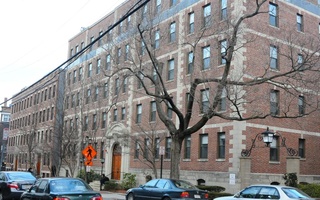A nonprofit environmental organization will move its headquarters to Harvard property in Allston this April, marking the University’s first succesful letting of a vacant property in the neighborhood since the December announcement of the halt of construction on the Allston Science Complex.
Last December, University President Drew G. Faust had announced that Harvard would be aggressively pursuing tenants for its unoccupied holdings in Allston in the wake of the indefinite halt of the science complex—a major component of Harvard’s plans to build a new campus across the Charles River.
On April 26, the Earthwatch Institute—an international nonprofit environmental organization—is set to occupy 15,000 square feet of space in the building that formerly housed WGBH’s media headquarters on 114 Western Avenue, University officials announced today. The institute will have a five-year lease with an option to renew for another five years.
The lease is representative of Harvard’s overall strategy of pursuing tenants for its vacant properties, according to Christine M. Heenan, vice president for public affairs and communications.
“We have looked wherever possible to fulfill a number of goals in our leasing strategy,” Heenan said. “We want active, vibrant, organizations which underscore priorities that overlap with our educational mission, while fulfilling economic development strategies that make sense for the city of Boston.”
In keeping with an “aggressive strategy” in pursuing possible tenants, Harvard has employed 13 brokers to find tenants for its unoccupied retail, warehouse, and office space in Allston, according to University Executive Vice President Katherine N. Lapp, who oversees the leasing of Allston property.
Harvard has approached “dozens and dozens” of organizations that might be interested in letting space in Allston, specifically those located in Cambridge, Lapp said.
Though the commercial real estate market in Boston and the nation is currently in crisis, Lapp said the economic climate will not deter Harvard’s goals in leasing its unoccupied properties.
“That hasn’t slowed us,” Lapp said. “In fact, it’s challenged us.”
Lapp said that she and her team have been targeting organizations that will “enhance the community,” such as the Earthwatch Institute, which approached the University about a potential lease a little under a year ago.
The institute—which engages in scientific field research and education to promote a sustainable environment—will offer three fellowships for Allston/Brighton public school teachers to join one of its research expeditions, according to Earthwatch President and CEO Ed Wilson.
He said he hopes that Earthwatch will hold lectures, open houses, and other forms of outreach to neighboring communities starting in June, and that the organization will have the opportunity to partner with the University on various projects.
Heenan noted that Earthwatch’s mission fell in line with the University’s commitment to sustainability.
“Harvard looks for synergies,” she said. “We really consider this a triple win: a win for Harvard, a win for Earthwatch, a win for the city of Boston.”
Paul Berkeley, an Allston resident, said he was pleased to see Harvard leasing to a “cutting edge” environmental group, given the halt on the construction of the Science complex.
Wilson said the move to Allston from Maynard, Mass. was motivated by a desire to be more centrally located and the proximity to Harvard.
—Staff writer Sofia E. Groopman can be reached at segroopm@fas.harvard.edu.
Read more in News
Young Expands Initiative to All GradesRecommended Articles
-
Group Meets Its Allston NeighborsTwo leaders of the Earthwatch Institute introduced themselves to the Allston community at an Allston Civic Association meeting last night, following Harvard’s announcement yesterday that the nonprofit environmental advocacy group would move its headquarters to a University-owned property in the neighborhood this April.
-
No More Allston Buys, Univ. SaysAlthough its year-long moratorium on property purchases in Allston will expire in two weeks, Harvard does not intend to purchase more real estate in the neighborhood in the coming months, according to University Executive Vice President Katharine N. Lapp.
-
Council Discusses Funding for Community Action ProgramsThe Cambridge City Council weighed in last night on the federal budget, passing a resolution urging President Barack Obama to maintain funding for the Community Services Block Grant—the primary funding source for community action programs.
-
Allston and the Royal WeddingThis month, an Allston-based non-profit is getting the royal treatment. Earthwatch Institute is an international non-profit organization concerned with environmental ...
-
Barry's Corner Plans Worry Allston ResidentsCommunity members expressed apprehensions about the University’s proposals for the Barry's Corner residential commons and retail center at the Harvard-Allston Task Force meeting Monday evening.
-
 Swing Housing Forces Relocation of Prescott Street Residents
Swing Housing Forces Relocation of Prescott Street Residents













